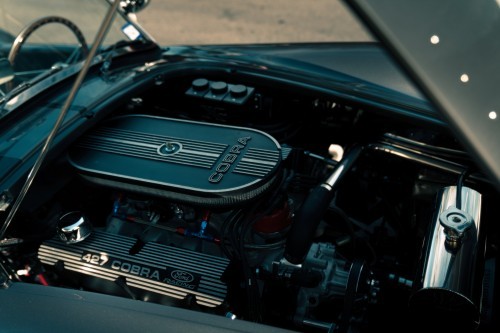The engine is the heart of any vehicle and getting the best oil for the 5.3 Vortec engine is crucial to getting the most out of it and extending its life. The 5.3 Vortec engine, well-known for its power and versatility, is a well-liked choice for several automobiles. In-depth analysis of viscosity, additives, and manufacturer recommendations are provided as we discuss the subtleties of choosing the best oil for the 5.3 Vortec. We aim to provide you with the knowledge you need to make an educated decision as we examine the many options available, guaranteeing not just optimal engine health but also greater longevity and efficiency.
Importance of proper lubrication for engine longevity and efficiency:
It is impossible to overstate how crucial good lubrication is to the longevity and efficiency of any internal combustion engine. When the intricate 5.3 Vortec engine is running, a lot of heat and friction are produced by the many metal components working together. High-quality engine oil is crucial in lessening these effects because it forms a protective barrier between moving parts. By doing this, you may reduce wear and strain and heat buildup, which will prevent premature component failure. Effective lubrication does more for engines than just keep them safe; it reduces energy waste, boosts fuel efficiency, and facilitates smoother running.

Understanding the 5.3 Vortec Engine:
A reliable powerplant with a reputation for performance and adaptability, the 5.3 Vortec engine finds use in a wide range of automobiles, including trucks and SUVs. To fully comprehend the 5.3 Vortec, one must examine the important characteristics and specs that have contributed to the engine’s reputation as dependable and potent one.
Displacement and Configuration:
- With a displacement of 5.3 liters, the 5.3 Vortec is a member of the Vortec engine family produced by General Motors.
- It is an engine arrangement known as a V8, with eight cylinders arranged in a V-shape.
Cylinder Heads and Valvetrain:
- Aluminum cylinder heads are standard on the engine, which helps to strike a balance between strength and decreased weight.
- Effective intake and exhaust procedures are guaranteed by a complex valvetrain system, and overhead valves (OHV) improve dependability and performance.
Fuel Delivery and Injection:
- Advanced fuel injection systems optimize the air-fuel combination for combustion efficiency by controlling fuel supply in the 5.3 Vortec.
- Sequential fuel injection, which precisely measures fuel supply to each cylinder for maximum performance, is a common characteristic of this engine.
Compression Ratio:
- One of the most important aspects of the 5.3 Vortec’s combustion efficiency is its compression ratio. Higher compression ratios are typically associated with increased engine power and efficiency.
Power and Torque:
- The 5.3 Vortec is known for having a lot of power and torque, which makes it capable of doing heavy lifting, towing, and other hard jobs.
- Various model years and applications may have various power outputs, which will be improved over time to match changing performance requirements.
Applications:
- The 5.3 Vortec engine is a popular choice for General Motors cars. It can be found in trucks like the GMC Sierra and Chevrolet Silverado, as well as SUVs like the Chevrolet Tahoe and Suburban.
Technology and Advancements:
- Technological developments have improved the 5.3 Vortec’s fuel economy, reduced pollutants, and improved engine performance over time.
- It is possible to include features like variable valve timing (VVT) to maximize power output under various operating scenarios.
Factors to Consider When Choosing Oil:
Making the proper oil choice for your 5.3 Vortec engine is an important choice that will affect both its longevity and performance. To ensure that the engine is properly lubricated and protected, the following essential elements should be considered while selecting an oil:
Viscosity Rating:
- Consider the suggested viscosity range for the 5.3 Vortec engine you own. Viscosity is the thickness of the oil, and depending on the operating circumstances and environment, engines may need varying viscosity levels. Viscosity grades 5W-30 and 10W-30 are typical examples.
Oil Additives:
- Seek lubricants that include corrosion- and wear-resistance compounds that improve performance. Anti-wear compounds, detergents to keep the engine clean, and antioxidants to stop oil degradation are examples of common additions.
Synthetic vs. Conventional Oil:
- Depending on your driving style and habits, think about using conventional or synthetic oil. Longer change intervals, enhanced protection, and superior high-temperature stability are often provided by synthetic oils. Conventional oils, however, could be appropriate in less taxing driving situations.
Oil Change Intervals:
- Using the manufacturer’s recommendations and your driving habits as a guide, determine how often to replace your oil. More frequent oil changes may be necessary due to certain factors like severe temperatures, stop-and-go traffic, or frequent towing.
Fuel Efficiency:
- Select an oil that helps to improve fuel economy. Certain synthetic oils are designed to increase fuel efficiency and decrease friction. Given the power and torque output of the 5.3 Vortec, using a perfectly balanced oil can maximize fuel economy.
Compatibility with Older Engines:
- Think about lubricants made for engines with potential problems like oil consumption if your older 5.3 Vortec engine has more miles on it. Certain high-mileage oils come with extra ingredients to help with frequent issues in older engines.
Cold-Start Performance:
- Analyse the oil’s performance in cold starts. To provide adequate lubrication when the engine is first started, the oil should flow readily at low temperatures.
Oil Filter Compatibility:
- Make sure the oil you select works with a high-quality oil filter. By removing impurities, the two parts function together to keep the engine clean. Selecting a reliable oil filter is also crucial for the general health of the engine.
Budget Considerations:
- Although the oil’s quality must be the top priority, take your budget into account. Although premium oils may cost more up front, they are frequently more cost-effective overall due to the protection and performance they provide for engines.

Best Oil Options for 5.3 Vortec:
When selecting the optimal oil for your 5.3 Vortec engine, you should consider variables including viscosity, additives, and the manufacturer’s specified specifications. For the 5.3 Vortec, the following oil choices are advised:
Mobil 1 Extended Performance Full Synthetic Motor Oil (5W-30):
- A well-known brand in the synthetic oil industry is Mobil 1. The Extended Performance version is intended to provide better overall engine cleaning, stability at feverish temperatures, and long-lasting protection.
Pennzoil Platinum Full Synthetic Motor Oil (5W-30):
- Pennzoil Platinum provides superior defense against deposits and engine wear. Because Pure Plus synthetic base oil is used in its formulation, it offers improved performance and protection—particularly in harsh environments.
Valvoline High Mileage Synthetic Blend Motor Oil (5W-30):
- Ageing engines require different maintenance, which is why Valvoline’s High Mileage Synthetic Blend is intended to help if your older 5.3 Vortec engine has more miles on it. It has additives to lower oil consumption and increase engine longevity.
Castrol EDGE Full Synthetic Motor Oil (5W-30):
- Castrol EDGE is renowned for offering exceptional strength and performance because of its sophisticated synthetic composition. It is intended to enhance engine response and decrease metal-to-metal contact.
Royal Purple High Performance Synthetic Motor Oil (5W-30):
- One of Royal Purple’s best-known products is its synthetic oils. The exclusive additive process provides less wear on engine parts, better protection, and increased fuel economy.
Shell Rotella Gas Truck Full Synthetic Motor Oil (5W-30):
- Although primarily linked with diesel engines, Shell Rotella provides a complete synthetic motor oil intended for petrol trucks, which includes those equipped with the 5.3 Vortec engine. It offers defense against heat, deposits, and wear and tear.
Special Considerations for Older 5.3 Vortec Engines:
Extraordinary measures are necessary to maintain continuing performance, solve any problems, and extend the engine’s lifespan as 5.3 Vortec engines age and accrue miles. For earlier 5.3 Vortec engines, keep the following points in mind:
Oil Consumption:
- It is possible for older engines to use more oil. Consider using high-mileage oils that have compounds meant to cut down on oil usage and preserve appropriate lubrication.
Leak Prevention:
- Oil leaks may be caused by ageing gaskets and seals. Keep an eye out for leaks in the engine and fix them as soon as you see them. Leaks can be minimized and prevented by using seal conditioners in conjunction with synthetic high-mileage oils.
Compression Testing:
- Test the compression on a regular basis to determine how well the engine’s internal parts are doing. A drop in compression might be a sign of problems that need to be fixed, such worn-out valves or piston rings.
Cooling System Maintenance:
- Water pumps and radiators are two examples of cooling system components that may deteriorate over time. Maintain the cooling system properly to avoid overheating, which can harm the engine.
Oil Change Intervals:
The kind of oil used, the driving circumstances, and the manufacturer’s recommendations must be considered when figuring out how often to replace the oil in your 5.3 Vortec engine. You may set oil change intervals by using the following basic guidelines:
Oil Change Reminder System:
- An oil change reminder system that tracks driving conditions and determines when an oil change is necessary is installed in some cars. This system could include variables including driving habits, mileage, and engine working hours.
Regular Inspection:
- Check the oil’s condition and level on a regular basis. It might be a clue that more frequent changes are required if you see a noticeable drop in the oil level between changes or if the oil seems polluted and unclean.
High-Mileage Considerations:
- To address potential problems like increased oil consumption and wear on engine components, consider shorter oil change intervals for older engines with higher mileage. Special additive-infused high-mileage oils could also be helpful.
Personal Driving Habits:
- It may be wise to replace the oil more regularly than the recommended frequency if you frequently drive in hazardous situations, such as pulling trailers or driving in extremely cold or hot weather.
Regular Maintenance Schedule:
- Follow the owner’s manual’s recommended general maintenance programmed in addition to oil changes. This includes examining and changing other fluids, examining belts and hoses, and taking care of any latest problems that may arise.
5.3 Vortec Engine
Frequently asked questions:
Which oil is ideal for a 5.3 engine?
A premium full synthetic oil with the appropriate viscosity rating that satisfies the engine manufacturer’s criteria is the best oil for a 5.3 engine.
What is the oil consumption of a 5.3 Vortec?
For every 3,000 to 5,000 miles, a 5.3 Vortec engine uses one to 1.5 quarts of oil.
Can I utilise 5W-30 rather than 0W-20?
For a 5.3 Vortec engine, 5W-30 can be used in a pinch, but for best results, use the manufacturer’s suggested 0W-20 oil.
What sort of oil is OK for a 2005 5.3?
5W-30 oil is normally recommended for a 2005 5.3 Vortec engine, but it is important to refer to the owner’s handbook for exact recommendations.
Conclusion:
In summary, preserving the health and functionality of your 5.3 Vortec engine begins with choosing the proper oil and setting up suitable oil change intervals. Given its reputation for strength and adaptability, the 5.3 Vortec needs special maintenance to guarantee that it will continue to function dependably over time. Through careful consideration of variables including viscosity, additives, and manufacturer guidelines, you may make well-informed judgements that promote the best possible lubrication and protection. Whether your engine is new, has a lot of miles on it, or is somewhere in the middle, keeping it in good working order will depend on routine maintenance, following manufacturer instructions, and paying close attention to road conditions.

